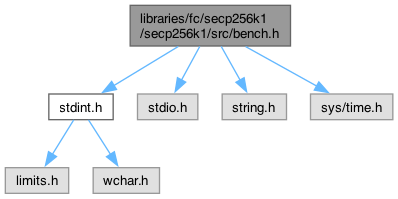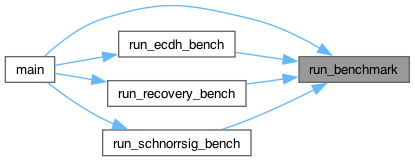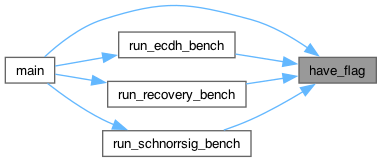Loading...
Searching...
No Matches
Include dependency graph for bench.h:

This graph shows which files directly or indirectly include this file:

Go to the source code of this file.
Macros | |
| #define | FP_EXP (6) |
| #define | FP_MULT (1000000LL) |
Functions | |
| void | print_number (const int64_t x) |
| void | run_benchmark (char *name, void(*benchmark)(void *, int), void(*setup)(void *), void(*teardown)(void *, int), void *data, int count, int iter) |
| int | have_flag (int argc, char **argv, char *flag) |
| int | have_invalid_args (int argc, char **argv, char **valid_args, size_t n) |
| int | get_iters (int default_iters) |
| void | print_output_table_header_row (void) |
Macro Definition Documentation
◆ FP_EXP
◆ FP_MULT
Function Documentation
◆ get_iters()
| int get_iters | ( | int | default_iters | ) |
◆ have_flag()
| int have_flag | ( | int | argc, |
| char ** | argv, | ||
| char * | flag ) |
◆ have_invalid_args()
| int have_invalid_args | ( | int | argc, |
| char ** | argv, | ||
| char ** | valid_args, | ||
| size_t | n ) |
Definition at line 132 of file bench.h.
132 {
133 size_t i;
134 int found_valid;
136 argv++;
137
139 found_valid = 0;
140 for (i = 0; i < n; i++) {
142 found_valid = 1; /* user entered a valid arg from the list */
143 break;
144 }
145 }
146 if (found_valid == 0) {
147 return 1; /* invalid arg found */
148 }
149 argv++;
150 }
151 return 0;
152}
Here is the caller graph for this function:

◆ print_number()
| void print_number | ( | const int64_t | x | ) |
Definition at line 25 of file bench.h.
25 {
27 int c, i, rounding, g; /* g = integer part size, c = fractional part size */
28 size_t ptr;
29 char buffer[30];
30
32 /* Prevent UB. */
34 return;
35 }
36 x_abs = x < 0 ? -x : x;
37
38 /* Determine how many decimals we want to show (more than FP_EXP makes no
39 * sense). */
40 y = x_abs;
41 c = 0;
43 y *= 10LL;
44 c++;
45 }
46
47 /* Round to 'c' decimals. */
48 y = x_abs;
49 rounding = 0;
51 rounding = (y % 10) >= 5;
52 y /= 10;
53 }
54 y += rounding;
55
56 /* Format and print the number. */
57 ptr = sizeof(buffer) - 1;
58 buffer[ptr] = 0;
59 g = 0;
60 if (c != 0) { /* non zero fractional part */
61 for (i = 0; i < c; ++i) {
63 y /= 10;
64 }
65 } else if (c == 0) { /* fractional part is 0 */
66 buffer[--ptr] = '0';
67 }
68 buffer[--ptr] = '.';
69 do {
71 y /= 10;
72 g++;
73 } while (y != 0);
74 if (x < 0) {
75 buffer[--ptr] = '-';
76 g++;
77 }
80}
LOGGING_API void printf(Category category, const char *format,...)
Definition Logging.cpp:30
Here is the caller graph for this function:

◆ print_output_table_header_row()
| void print_output_table_header_row | ( | void | ) |
◆ run_benchmark()
| void run_benchmark | ( | char * | name, |
| void(* | benchmark )(void *, int), | ||
| void(* | setup )(void *), | ||
| void(* | teardown )(void *, int), | ||
| void * | data, | ||
| int | count, | ||
| int | iter ) |
Definition at line 82 of file bench.h.
82 {
83 int i;
85 int64_t sum = 0;
86 int64_t max = 0;
88 int64_t begin, total;
89 if (setup != NULL) {
90 setup(data);
91 }
92 begin = gettime_i64();
93 benchmark(data, iter);
94 total = gettime_i64() - begin;
95 if (teardown != NULL) {
96 teardown(data, iter);
97 }
98 if (total < min) {
99 min = total;
100 }
101 if (total > max) {
102 max = total;
103 }
104 sum += total;
105 }
106 /* ',' is used as a column delimiter */
114}
Here is the call graph for this function:

Here is the caller graph for this function:



